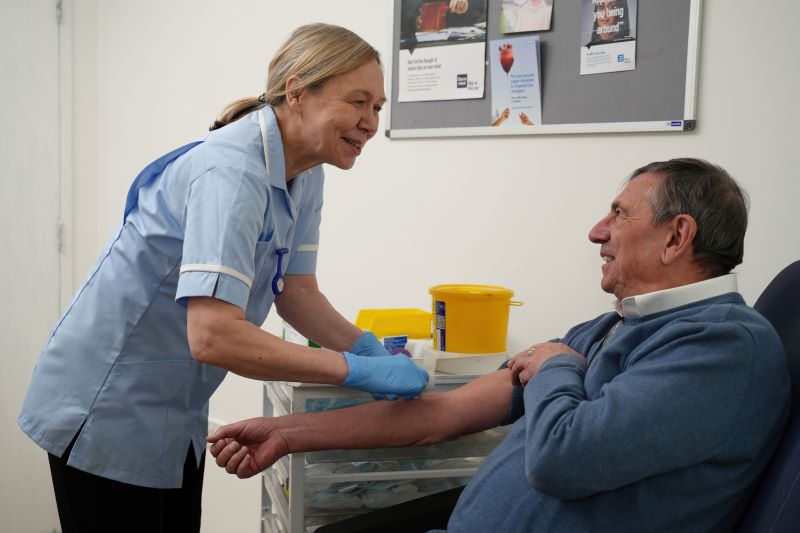
PSA Consensus 2024
Optimising the use of the Prostate-Specific Antigen (PSA) blood test in asymptomatic men for early prostate cancer detection in primary care: Report from a UK clinical consensus.
Background
We commissioned a project to deliver a new consensus on the best use of the prostate-specific antigen (PSA) blood test in asymptomatic men in the UK.
The consensus was produced with the involvement of men with lived experience and clinical / academic prostate cancer experts.
Right now, PSA testing guidelines for primary care and men are outdated:
- Guidelines are based on an outdated evidence-base and clinical trials that tested the old prostate cancer diagnostic pathway, i.e. PSA test, then biopsy.
- They do not provide clear guidance on the men considered to be higher-than-average risk (Black men 45+, men with a family history of prostate cancer 45+ and men with confirmed BRCA2 gene variations).
- NICE 2019 guidelines: recommend pre-biopsy multiparametric MRI (mpMRI) and active surveillance for men in Cambridge Prognostic Group (CPG)1 and CPG2 risk groups, making the prostate cancer diagnostic and treatment pathways safer and more accurate, whilst reducing the potential for overtreatment.
Guidelines also have the potential to exacerbate health inequalities because, although the PSA test is freely available on the NHS, GPs are told not to proactively raise the issue of PSA testing with asymptomatic men.
This benefits men who know about the PSA blood test and know how to request one from their GP (frequently the most health literate and affluent). This has resulted in uneven PSA testing rates in the UK with evidence showing that men living in the South, and the least deprived regions, have higher PSA testing rates.
Therefore, the consensus from the current study challenges previous PSA testing policy. It recommends proactive approaches in men at higher-than-average risk but does not go as far as recommending population or targeted screening.
PSA Consensus 2024
Read the PSA consensus paper in full in the British Journal of General Practice (BJGP).
Highlights
The consensus has highlighted several areas where changes to policy and practice should be considered.
1. Awareness
There is a need to raise awareness of prostate cancer among men aged 50+, or from aged 45 for Black men and men with a family history of prostate cancer.
Responsibility for raising awareness of prostate cancer is shared by charities, the NHS (primary and secondary care), Governments, and public health bodies.
2. Primary Care
Trained health professionals (e.g. general practice nurse) can counsel men on the PSA blood test – not just GPs, offering the potential to widen access for men who want to discuss the pros and cons of the PSA test.
Men with a PSA level above the referral threshold (≥3.0ng/mL) do not need to have a DRE prior to referral to secondary care. Evidence suggests DRE has limited benefit as a screening tool in primary care, and is a known barrier for some men coming forwards for prostate health checks, believing it is the first and only test for prostate cancer or feel anxiety, shame, or embarrassment about it.
Primary care professionals should proactively discuss prostate cancer risk, PSA testing, and the wider diagnostic pathway with
- Black men ≥45
- Men with family history of prostate cancer ≥45
- Men with confirmed genetic risk factors for prostate cancer e.g. BRCA2 gene variation.
Men should be given balanced information on the pros and cons of the PSA blood test and supported to make an informed choice whether to have one. [That information can come from trained health professionals, charities, or can be delivered via validated online tools to support informed choice].
All informed men should have the potential to access the PSA blood test from the age of 50 years.
3. Black men
Primary care health professionals should proactively discuss prostate cancer risk, PSA testing and the wider diagnostic pathway with men over the age of 45 at higher-than-average risk of prostate cancer due to Black ethnicity.
Furthermore, it's strongly recommended that for Black men with a known family history of prostate, breast or ovarian cancer – in particular if a first degree relative has died at a young age of this cancer – the PSA blood test should be proactively discussed from the age of 45.
4. Readiness for screening in the UK
Statements about the readiness for screening of asymptomatic men men in the UK did not reach consensus - with some panelists strongly agreeing and others strongly disagreeing. Concerns around overdiagnosis and overtreatment associated with PSA testing remain. However, consensus was reached on the following statements:
- The PSA blood test is the first step in the prostate cancer diagnostic pathway. It is a cheap, safe, and effective way of identifying men who would benefit from further testing – in the first instance an MRI scan.
- The balance of benefits and harms is shifting in favour of screening, but evidence gaps remain, and more research is needed.
- To tackle inequalities of access and reduce burden on primary care, the NHS should commission services that enable men at risk of prostate cancer to access PSA testing outside of primary care.
There is a clear need to develop an effective prostate cancer screening programme to reduce the substantial number of late-stage diagnoses in the UK, whilst reducing overdiagnosis and overtreatment of non-aggressive cancers. Future research should prioritise discovery, and validation, of pathways that:
- Find aggressive cancers which are currently being missed.
- Further reduce harms (unnecessary biopsies, detection of clinically insignificant disease) in men who undergo PSA testing through informed choice.
- Allow for better risk stratification of men who undergo PSA testing through informed choice.
This is why we're funding the TRANSFORM trial, to find the best way to screen men for prostate cancer, so one day all men at risk can be invited for regular testing to help find the aggressive cancers in time for a cure.
"As a GP, it's frustrating that current Department of Health & Social Care guidelines on PSA testing in men without symptoms provide very limited detail for us and our patients. It is unclear what should be done for men at higher risk of prostate cancer, how often men who choose to have the PSA blood test should have one, and when it would be in a man’s best interest to stop testing.”
"There has long been disagreement about the benefits and harms of the PSA blood test. However, with the publication of this new paper, we've shown there's broad agreement among the top minds in urology and prostate cancer care that the PSA blood test is simple and safe – and that GPs should consider proactively discussing the test with Black men and men with a family history from the age of 45."
- Dr Sam Merriel, one of the authors of the paper, GP, and Academic Clinical lecturer at the University of Manchester
“Before I was diagnosed, I had no idea that as a Black man I was at double the risk of prostate cancer.
“Thankfully, I was diagnosed early, before it spread beyond the prostate, but I know a lot of men aren’t so lucky. That’s why I’ve spent the years since working to raise awareness and offer support to men in Wolverhampton with prostate cancer, with a particular focus on Black men.
“When I heard about the chance to be involved in this project and help highlight how this disease really impacts men who are diagnosed, I knew I had to get involved. Too many Black men are simply never told about their risk of the disease. That’s why I support the findings of this paper and Prostate Cancer UK’s calls to change guidance so GPs can start having more potentially lifesaving conversations."
- Junior Hemans, from Wolverhampton, was diagnosed with prostate cancer in 2014, at the age of 51 as part of a routine health check. Junior was part of the panel of men with lived experience of prostate cancer who shared their stories to support the drafting of the PSA Consensus paper.
PSA Consensus 2024
Read the PSA consensus paper in full in the British Journal of General Practice (BJGP).
PSA consensus conference 2024
Check out these webinars from our PSA consensus conference in September 2024. This will help you understand more about the experiences of men, the modern prostate cancer diagnsotic pathway, and recommendations for primary care to optimize the use of the PSA blood test in asymptomatic men.
- Meg Burgess, Senior Specialist Nurse at Prostate Cancer UK, leads a lived experience conversation with Tony, Junior, and Patrick. - watch now!
- Dr. Olly Hulson provides an overview of the modern prostate cancer diagnostic pathway - watch now!
- Dr. Sam Merriel presents PSA consensus recommendations and implications for practice - watch now!




